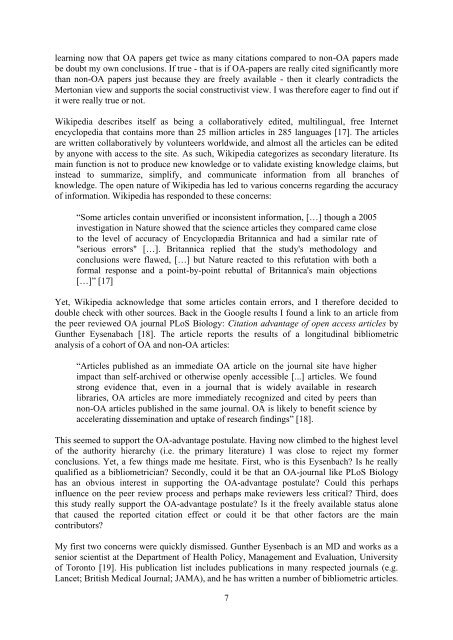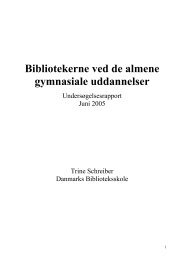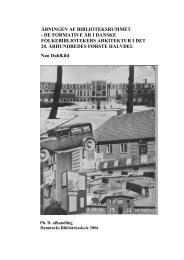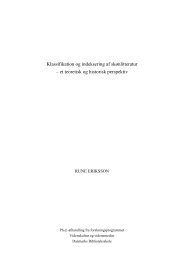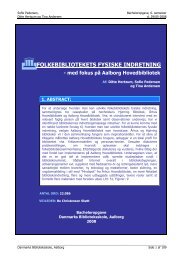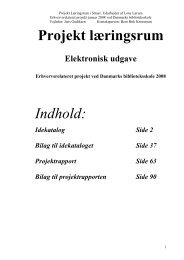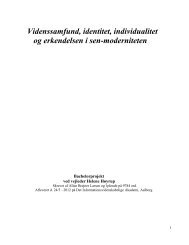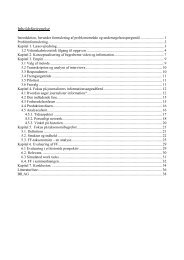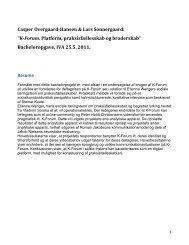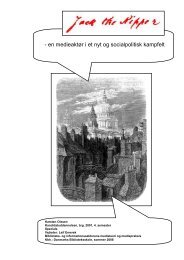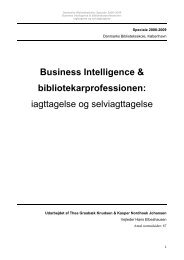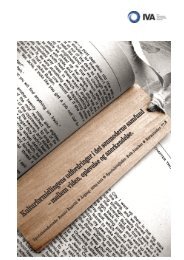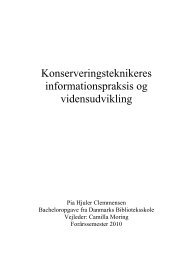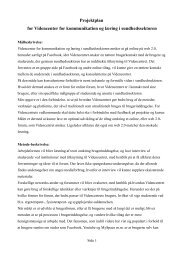how to detect misinformation on the internet
how to detect misinformation on the internet
how to detect misinformation on the internet
You also want an ePaper? Increase the reach of your titles
YUMPU automatically turns print PDFs into web optimized ePapers that Google loves.
learning now that OA papers get twice as many citati<strong>on</strong>s compared <str<strong>on</strong>g>to</str<strong>on</strong>g> n<strong>on</strong>-OA papers made<br />
be doubt my own c<strong>on</strong>clusi<strong>on</strong>s. If true - that is if OA-papers are really cited significantly more<br />
than n<strong>on</strong>-OA papers just because <strong>the</strong>y are freely available - <strong>the</strong>n it clearly c<strong>on</strong>tradicts <strong>the</strong><br />
Mer<str<strong>on</strong>g>to</str<strong>on</strong>g>nian view and supports <strong>the</strong> social c<strong>on</strong>structivist view. I was <strong>the</strong>refore eager <str<strong>on</strong>g>to</str<strong>on</strong>g> find out if<br />
it were really true or not.<br />
Wikipedia describes itself as being a collaboratively edited, multilingual, free Internet<br />
encyclopedia that c<strong>on</strong>tains more than 25 milli<strong>on</strong> articles in 285 languages [17]. The articles<br />
are written collaboratively by volunteers worldwide, and almost all <strong>the</strong> articles can be edited<br />
by any<strong>on</strong>e with access <str<strong>on</strong>g>to</str<strong>on</strong>g> <strong>the</strong> site. As such, Wikipedia categorizes as sec<strong>on</strong>dary literature. Its<br />
main functi<strong>on</strong> is not <str<strong>on</strong>g>to</str<strong>on</strong>g> produce new knowledge or <str<strong>on</strong>g>to</str<strong>on</strong>g> validate existing knowledge claims, but<br />
instead <str<strong>on</strong>g>to</str<strong>on</strong>g> summarize, simplify, and communicate informati<strong>on</strong> from all branches of<br />
knowledge. The open nature of Wikipedia has led <str<strong>on</strong>g>to</str<strong>on</strong>g> various c<strong>on</strong>cerns regarding <strong>the</strong> accuracy<br />
of informati<strong>on</strong>. Wikipedia has resp<strong>on</strong>ded <str<strong>on</strong>g>to</str<strong>on</strong>g> <strong>the</strong>se c<strong>on</strong>cerns:<br />
“Some articles c<strong>on</strong>tain unverified or inc<strong>on</strong>sistent informati<strong>on</strong>, […] though a 2005<br />
investigati<strong>on</strong> in Nature s<str<strong>on</strong>g>how</str<strong>on</strong>g>ed that <strong>the</strong> science articles <strong>the</strong>y compared came close<br />
<str<strong>on</strong>g>to</str<strong>on</strong>g> <strong>the</strong> level of accuracy of Encyclopædia Britannica and had a similar rate of<br />
"serious errors" […]. Britannica replied that <strong>the</strong> study's methodology and<br />
c<strong>on</strong>clusi<strong>on</strong>s were flawed, […] but Nature reacted <str<strong>on</strong>g>to</str<strong>on</strong>g> this refutati<strong>on</strong> with both a<br />
formal resp<strong>on</strong>se and a point-by-point rebuttal of Britannica's main objecti<strong>on</strong>s<br />
[…]” [17]<br />
Yet, Wikipedia acknowledge that some articles c<strong>on</strong>tain errors, and I <strong>the</strong>refore decided <str<strong>on</strong>g>to</str<strong>on</strong>g><br />
double check with o<strong>the</strong>r sources. Back in <strong>the</strong> Google results I found a link <str<strong>on</strong>g>to</str<strong>on</strong>g> an article from<br />
<strong>the</strong> peer reviewed OA journal PLoS Biology: Citati<strong>on</strong> advantage of open access articles by<br />
Gun<strong>the</strong>r Eysenabach [18]. The article reports <strong>the</strong> results of a l<strong>on</strong>gitudinal bibliometric<br />
analysis of a cohort of OA and n<strong>on</strong>-OA articles:<br />
“Articles published as an immediate OA article <strong>on</strong> <strong>the</strong> journal site have higher<br />
impact than self-archived or o<strong>the</strong>rwise openly accessible [...] articles. We found<br />
str<strong>on</strong>g evidence that, even in a journal that is widely available in research<br />
libraries, OA articles are more immediately recognized and cited by peers than<br />
n<strong>on</strong>-OA articles published in <strong>the</strong> same journal. OA is likely <str<strong>on</strong>g>to</str<strong>on</strong>g> benefit science by<br />
accelerating disseminati<strong>on</strong> and uptake of research findings” [18].<br />
This seemed <str<strong>on</strong>g>to</str<strong>on</strong>g> support <strong>the</strong> OA-advantage postulate. Having now climbed <str<strong>on</strong>g>to</str<strong>on</strong>g> <strong>the</strong> highest level<br />
of <strong>the</strong> authority hierarchy (i.e. <strong>the</strong> primary literature) I was close <str<strong>on</strong>g>to</str<strong>on</strong>g> reject my former<br />
c<strong>on</strong>clusi<strong>on</strong>s. Yet, a few things made me hesitate. First, who is this Eysenbach? Is he really<br />
qualified as a bibliometrician? Sec<strong>on</strong>dly, could it be that an OA-journal like PLoS Biology<br />
has an obvious interest in supporting <strong>the</strong> OA-advantage postulate? Could this perhaps<br />
influence <strong>on</strong> <strong>the</strong> peer review process and perhaps make reviewers less critical? Third, does<br />
this study really support <strong>the</strong> OA-advantage postulate? Is it <strong>the</strong> freely available status al<strong>on</strong>e<br />
that caused <strong>the</strong> reported citati<strong>on</strong> effect or could it be that o<strong>the</strong>r fac<str<strong>on</strong>g>to</str<strong>on</strong>g>rs are <strong>the</strong> main<br />
c<strong>on</strong>tribu<str<strong>on</strong>g>to</str<strong>on</strong>g>rs?<br />
My first two c<strong>on</strong>cerns were quickly dismissed. Gun<strong>the</strong>r Eysenbach is an MD and works as a<br />
senior scientist at <strong>the</strong> Department of Health Policy, Management and Evaluati<strong>on</strong>, University<br />
of Tor<strong>on</strong><str<strong>on</strong>g>to</str<strong>on</strong>g> [19]. His publicati<strong>on</strong> list includes publicati<strong>on</strong>s in many respected journals (e.g.<br />
Lancet; British Medical Journal; JAMA), and he has written a number of bibliometric articles.<br />
7


